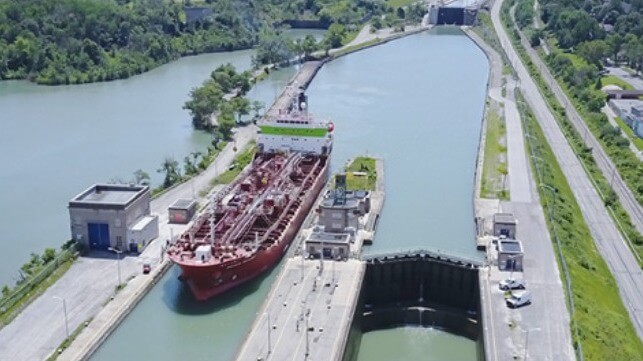St. Lawrence Seaway Resumes Operations with Tentative Labor Deal

Shipping began moving along the St. Lawrence Seaway on Monday morning after union members began returning to work after an eight-day strike. Late on Sunday, the Canadian corporation responsible for the management of much of the seaway and its union announced a tentative agreement.
“We will begin to implement our recovery program immediately and will start passing ships progressively as of Monday, October 30th, with the return-to-work of employees at 07:00 am,” the St. Lawrence Seaway Management Corporation announced Sunday night while noting that the agreement will have to be ratified by employees in the coming days. Operating 13 of the 15 locks along the nearly 200-mile route from Montreal, Canada to Lake Eire, the corporation was forced to suspend operations on October 22 when the strike began.
It was the first strike in the 55 years of the seaway, noted officials from Unifor, the union representing the 360 workers along the route. The strike had centered on wages and the impact of inflation with both sides saying the tentative agreement would be made public after members voted to ratify it.
The week-long strike came at a critical time of year for the route as growers and shippers worked to move grain and other commodities after the harvest and before the waterway shuts for the winter. There is just over a month left in the 2023 season as the seaway begins winding down in early December before closing around the end of the year. It does not reopen until late March.
The Canadian Chamber of Commerce reported that the strike was costing approximately US$24.5 million per day in disrupted economic activities. They estimated as many as 150 vessels had been impacted, forced to lay up at various points around the Great Lakes. The seaway moves more than 36 million metric tons of cargo annually valued at US$12 billion.
Bruce Burrows, CEO of the Chamber of Marine Commerce predicted to the Canadian Press that it would take around five days for the system to recover and clear the backlog of ships. He reported that nearly 100 ships were waiting for passage.
Contract negotiations resumed at the end of last week aided by federal mediators. There were growing calls from businesses and elected officials for the government to intervene and order the union back to work due to the time pressures from the shipping community. Company and union officials noted however that they were able to resolve the dispute at the negotiating table reaching what is being called a fair deal for workers and securing the future of the seaway system.

that matters most
Get the latest maritime news delivered to your inbox daily.
It was the second major strike impacting the Canadian supply chain in recent months and the second time federal mediators were required to resolve a labor dispute. Dockworkers went on strike at Canada’s Pacific coast ports in July.
Canada’s labor troubles along its supply chain may not be over even with this settlement. Last week, it was reported that the Maritime Employers Association, which represents the dockworkers at the Port of Montreal applied for mediation for their contract negotiations. The Journal of Commerce reported that the talks have been ongoing since mid-September for the Port of Montreal and are currently deadlocked.
